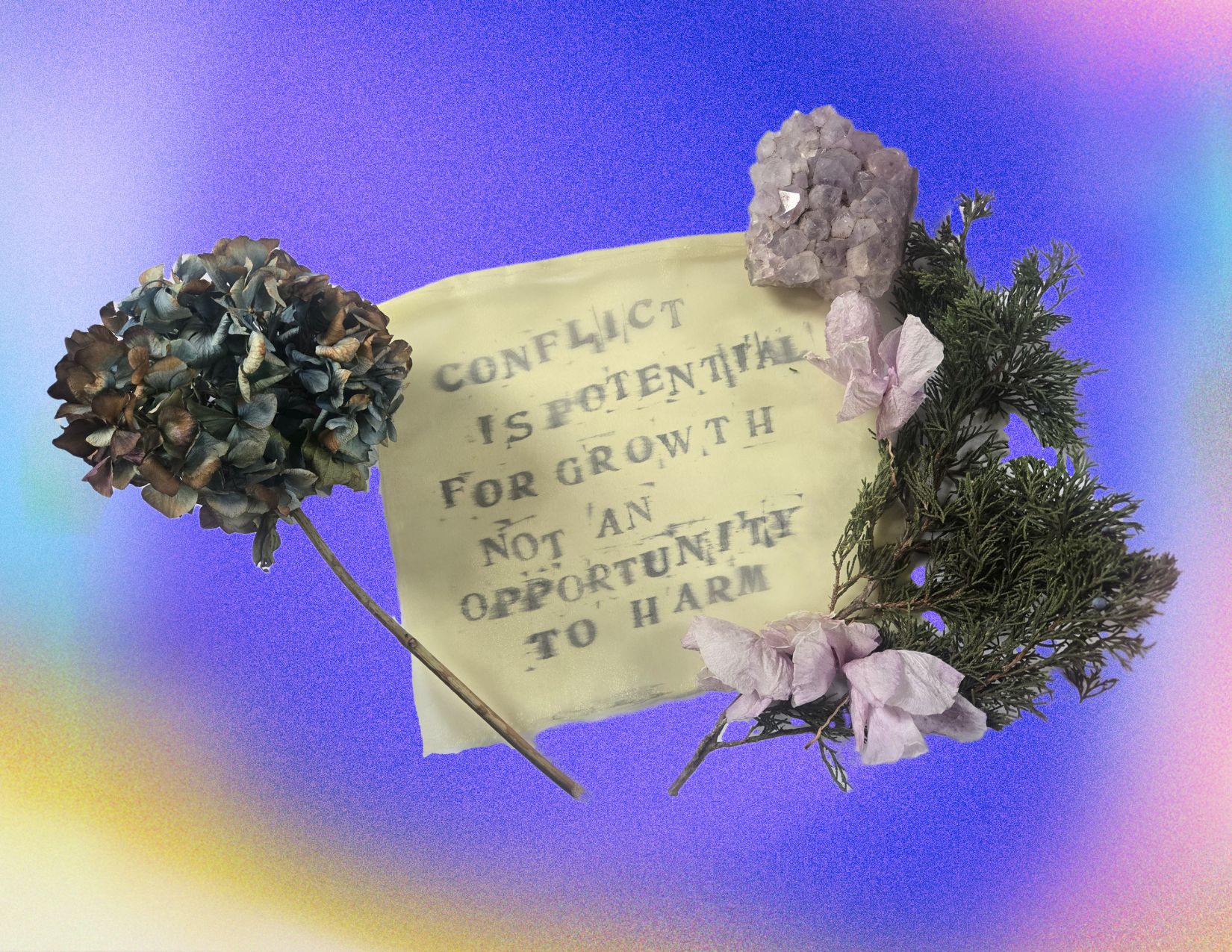Relationships are the glue that holds us together, connecting us with our inner selves and the outside world. They’re also spaces of rupture, disruption, and dis-ease.
In the nonprofit community, relationships can be our greatest resource and simultaneously one of the places we experience the most “wear and tear.” Conflict shows up particularly as groups compete for increasingly scarce resources and navigate contending interests. Organizations also often house generations of complex relationships. When I work with nonprofits, whether one-on-one with clients or with whole collectives, I spend a bunch of my time supporting people in managing these relational landscapes and hierarchies.
Even in the most ideal circumstances, relational ruptures occur; in fact, they’re inevitable. Everyone has different sets of values, beliefs, needs, and experiences. When these rub up against each other, conflict occurs.
Many folks try to avoid conflict occurring in the first place, meaning they might feel the need to minimize their needs or not bring some of their potentially valuable lived experiences into the space. Once conflict does occur, many people do their best to resolve it as soon as possible by jumping to a solution, even if it might not be the best fit, with the drive to just get out of the uncomfortable space of conflict at all costs!
But what if we viewed those places of rupture as growth edges: somewhere to build stronger connections with one another, and therefore more robust collectives?
Generative conflict is the kind of approach to conflict that encourages growth, inner-personally, interpersonally, and collectively. If we are aiming for systems change, we have to begin by implementing the values we want to see within ourselves and between one another. Ultimately by taking the approach that we want to “do conflict better,” we have the opportunity to do less harm to each other and get better at the actual process of being in conflict. We can also create more thoughtful, nuanced, and just solutions across the board when faced with these relational problems.
Deeply rooted in transformative justice, generative conflict is a set of actionable principles that seeks to bend the arc of our relationships towards more sustainable connections with each other and ultimately our planet. Generative conflict encourages us to really think big picture about how we go about possible solutions, changing our perspectives to get curious about who we’re in conflict with and what might be at stake as we move towards resolutions.
As conflict is indeed inevitable, why not strive to engage in it more skillfully, artfully, and with more care?
- What might be possible if we approach conflict rather than avoid it?
- How do we get more comfortable in a space of conflict? How can somatics (tools that engage the body) support us in this?
- What are the principles of generative conflict and how can we practice these in our organizations and collectives?
If you’re curious, and if you believe you and/or your organization(s) might benefit from a deeper dive into how to approach conflict as a chance to grow together rather than break apart, sign up for my virtual training through TSNE. Also, check out my website to connect around this and see other offerings that center more healing and expansive ways of relating to ourselves and one another.
–
 Anna-Maria D’Cruz, Ph.D. (she/they) is an interdisciplinary care practitioner and creative. A trained clinical psychologist, Anna-Maria grounds her practice in the principles of healing justice. She supports individuals and collectives in transforming their relationships with themselves, each other and the world around them. Find her on Instagram at @anna_maria_dcruz_phd.
Anna-Maria D’Cruz, Ph.D. (she/they) is an interdisciplinary care practitioner and creative. A trained clinical psychologist, Anna-Maria grounds her practice in the principles of healing justice. She supports individuals and collectives in transforming their relationships with themselves, each other and the world around them. Find her on Instagram at @anna_maria_dcruz_phd.
Header Image Description: Art from one of Anna-Maria’s arts’ offerings, The Prayer Flag Project, an interactive community healing arts installation. Anna-Maria believes creative sovereignty is a fundamental human need. At a time when certain voices are increasingly being silenced over others, The Prayer Flag Project is intended to uplift our collective wisdom as we vision a more liberated and just world, not only for some but for all. This work honors a decolonial reclamation of Anna-Maria’s South Asian ancestry.
